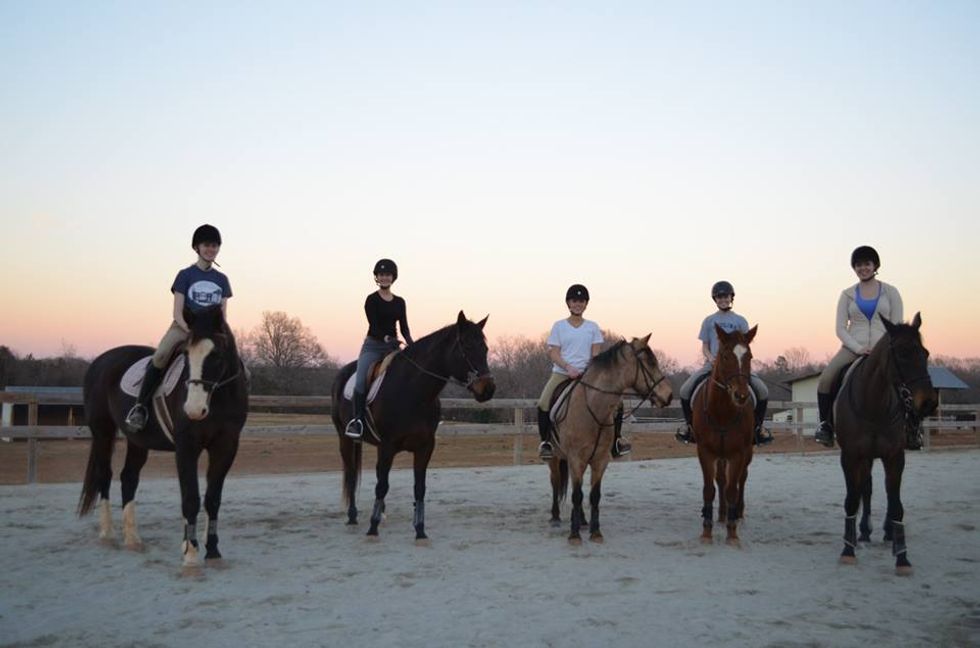I had my first horseback riding lesson when I was 5-years-old and got my first horse when I was just nine. Most people would call my mom crazy for buying her daughter a 1,000-pound animal at such a young age, but it turns out owning a horse can actually teach you a lot of lessons about life.
Horses teach us how to be patient.
Training horses requires patience. You can’t become a marathon runner in two days if you’ve never ran farther than a few miles before. Similarly, a horse doesn’t become a top competitor over night. It takes weeks, months, and even years to train a horse and see successful results. Horseback riders understand this need for patience. You can’t get frustrated right off the bat or you’ll never get anywhere. It takes time. And lots of it.
Horses teach us to be flexible, both physically and mentally.
Sometimes when you’re working with an animal that weighs 1,000 pounds or more, you’re not going to get your way immediately. You have to learn to be flexible mentally. Horses are large animals, and you never know exactly what to expect from them. One day they may be perfectly well behaved, and the next you may find yourself laying on the hard ground after your horse has spooked at what appears to be nothing but air. Horses teach us to go with the flow and react as things happen. And if you end up in the second scenario a lot, you better be physically flexible as your body twists and somersaults off your horse’s back and toward the ground.
Horses teach us perseverance.
"It's not how hard you fall, but how fast you get back up." "'Fall down seven times, stand up eight." "What defines us is how well we rise after falling." I'm sure you've heard these and similar quotes before. Well, horseback riding literally teaches you to fall and get back up. Horseback riders possess this perseverance like no other. Bruises, cuts, blood? As long as they're not in the back of an ambulance being rushed to the ER, you can bet they'll be getting right back on their horse. Horses teach us to keep riding no matter how tough the ride may get.
Horses teach us responsibility and dedication.
Not only does training a horse take time, but so does caring for it. You can’t half-heartedly own a horse. You have to be dedicated to it in order to assure the horse remains healthy. First-time horse buyers often overlook the great amount of responsibility that comes with owning a horse. It is very time-consuming, especially if you do not board it somewhere, but rather take care of it on your own. Nothing teaches a young person responsibility quite like owning a horse. Waking up 30 minutes earlier every morning to feed the horses and clean the barn before school requires a certain kind of dedication. Having to leave a friend’s house early and skip out on fun plans because you have horses to feed at home puts this dedication to the test. If owning a horse has taught me one thing, it’s responsibility. I may not have the experience of having to take care of a child yet, but being responsible for the well being of two horses everyday sure has taught me a lot about commitment.
Horses teach us coordination and balance.
Unlike most sports that focus on either hand-eye or foot-eye coordination, horseback riding requires one to have control over and utilize practically every part of the body. The smallest movements can communicate a command to the horse. In addition, horseback riders develop strong core muscles that keep them balanced on the horse even when unexpected things happen.
Horses teach us how to be a confident leader.
They say horses can sense when you're scared and that they can feel your heartbeat racing. Whether this is true or not, horses react the same way humans do to intimidating leaders. According to a Fortune article on what horses can teach us about leadership, "you can't let your horse - or your team - push you around. If you do not provide the leadership, the horse will." You must be clear and consistent when working with horses. Since they do not speak, body language is very important. To assert leadership, you must stand up tall and be confident. Similar to in the business world, if you have poor posture and your body language shows weakness, the horse is more likely to not take you as seriously and take advantage of you, refusing to listen to your commands. Horses teach us that body language can be just as important as words.
















